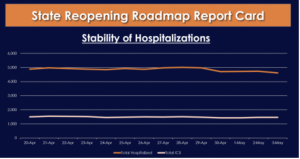Governor issues Report Card on state’s progress in fighting COVID-19
Governor’s Report Card indicates California will be prepared to move into the early phase of Stage 2 of reopening this Friday, May 8
Stage 2 allows gradual reopening of lower-risk workplaces with adaptations including bookstores, clothing stores, florists and sporting goods stores, with modifications
Governor also announces new framework to allow counties to move more quickly through Stage 2 if they attest that they meet the state’s readiness criteria
State announces accelerated action to secure contact tracing capacity
SACRAMENTO – As the state continues implementation of the four-stage framework to allow Californians to gradually reopen some lower-risk businesses and public spaces while continuing to preserve public health, Governor Gavin Newsom today announced that based on the state’s progress in meeting metrics tied to indicators, the state can begin to move into Stage 2 of modifying the stay at home order this Friday, May 8, with guidelines released Thursday, May 7. The Governor released a Report Card showing how the state has made progress in fighting COVID-19 in a number of categories such as stabilized hospitalization and ICU numbers and acquiring PPE.
“Millions of Californians answered the call to stay home and thanks to them, we are in a position to begin moving into our next stage of modifying our stay at home order,” said Governor Newsom. “But make no mistake – this virus isn’t gone. It’s still dangerous and poses a significant public health risk. As we move into the next stage of reopening, we will do so with updated guidance to help qualifying businesses make modifications needed to lower the risk of COVID-19 exposure to customers and workers. Californians should prepare now for that second stage of reopening.”
State Report Card
The Governor also issued a state “Report Card” for how the state is doing in meeting key measures for moving into Stage 2. California is on track on the following statewide metrics:
- Stability of Hospitalizations
- Personal Protective Equipment Inventory
- Health Care Surge Capacity
- Testing Capacity
- Contact Tracing Capability
- Public Health Guidance in Place

California Department of Public Health Director and state Public Health Officer Dr. Sonia Angell presented on the state’s Report Card today to underscore the data driving the move into the next stage.
What’s in Early Stage 2
Later this week the state will release public health guidance for certain Stage 2 sectors including some retail, manufacturing, and logistics businesses, which will outline modifications that lower the risk of transmission. Businesses and employers in those sectors will be able to reopen as soon as Friday – if they can meet the guidelines provided by the state. Not all Stage 2 businesses will be able to open Friday with modifications. Some examples of businesses that can open with modifications include bookstores, clothing stores, florists and sporting goods stores.
Other Stage 2 sectors, such as offices and dine-in restaurants, will be part of a later Stage 2 opening. The announcement for Friday does not include offices, seated dining at restaurants, shopping malls or schools. As the Governor noted last week, the state is working with school districts and the California education community to determine how best and safely to reopen. That continues to be the case – this May 8 announcement does not move up this timeline.
While the state will be moving from Stage 1 to Stage 2, counties can choose to continue more restrictive measures in place based on their local conditions, and the state expects some counties to keep their more robust stay at home orders in place beyond May 8.
Regional Variation
The Governor also announced today that while the state is moving into Stage 2 together, counties can move more quickly through Stage 2, if they attest that they meet the state’s readiness criteria. Counties must create and submit a readiness plan which the state will make publicly available.
The Governor signed an executive order today directing the State Public Health Officer to establish criteria to determine whether and how, in light of local conditions, local health officers may implement public health measures less restrictive than the statewide public health directives. Counties must meet criteria including demonstrating they have a low prevalence of COVID-19, that they meet testing and contact tracing criteria, that their health care system is prepared in case they see a sudden rise in cases, and that they have plans in place to protect vulnerable populations. The state will outline these criteria in the coming days. The text of the Governor’s executive order can be found here.
Contact Tracing
Contact tracing enables the state to suppress the spread of the virus to avoid outbreaks and allows us to maintain our health care capacity and confidently modify the stay at home order. To work toward these goals, the Governor announced a partnership with the University of California, San Francisco and University of California, Los Angeles to immediately begin training workers for a landmark contact tracing program that will help contain the ongoing COVID-19 pandemic while the state looks to modify the stay at home order. The partnership will include a virtual training academy for contact tracers. The first 20-hour training will begin Wednesday, May 6 with the goal of training 20,000 individuals in two months.
###
